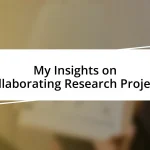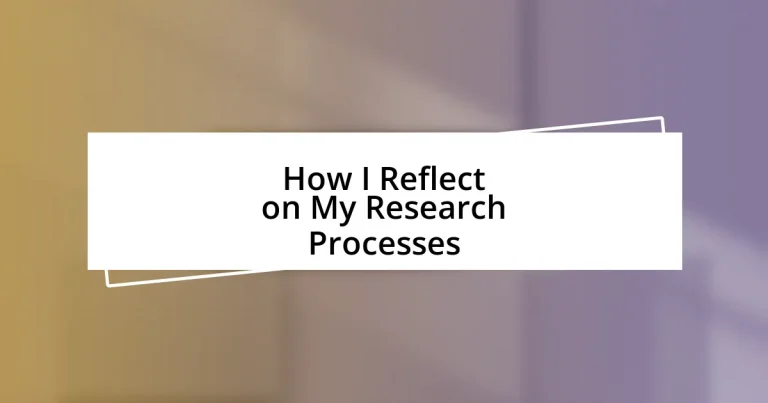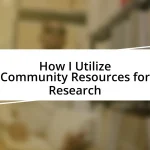Key takeaways:
- Reflection enhances understanding and drives deeper engagement with the research process, enabling identification of mistakes and patterns in thinking.
- Utilizing systematic approaches, intuition, and collaboration is crucial for uncovering key insights in research.
- Documenting challenges and solutions fosters resilience, promotes ethical considerations, and helps streamline future research processes.
- Gathering peer feedback is essential for refining research, gaining fresh perspectives, and identifying gaps in work.
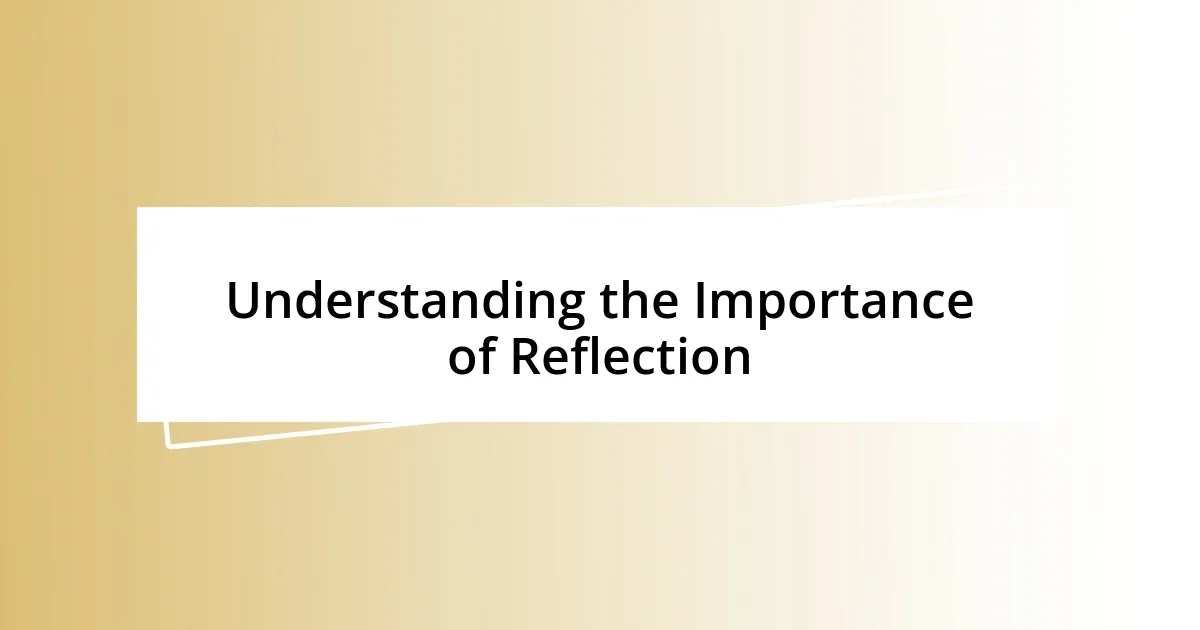
Understanding the Importance of Reflection
Reflection serves as a powerful tool in deepening my understanding of my research processes. I remember a time when I stumbled upon an inconsistency in my data analysis after revisiting my notes. That moment made me realize how much I had overlooked during the initial stages and prompted me to ask: What if I hadn’t taken that time to reflect? The clarity I gained was invaluable.
Through my own experiences, I’ve learned that it’s not just about identifying mistakes; reflection exposes patterns in my thinking. For instance, I once found myself repeatedly drawn to the same methodology until I paused to consider why. This simple act of questioning led me to explore new approaches and ultimately enhanced the depth of my research. Isn’t it fascinating how a small shift in perspective can unlock new avenues?
Reflection also allows me to connect emotionally with the research process. I often find myself considering the bigger picture: How does this research impact real lives? When I take the time to reflect, I not only become more aware of my motivations; I feel a deeper sense of responsibility towards the individuals affected by my findings. This realization drives me to carry out my work with greater intention and empathy.
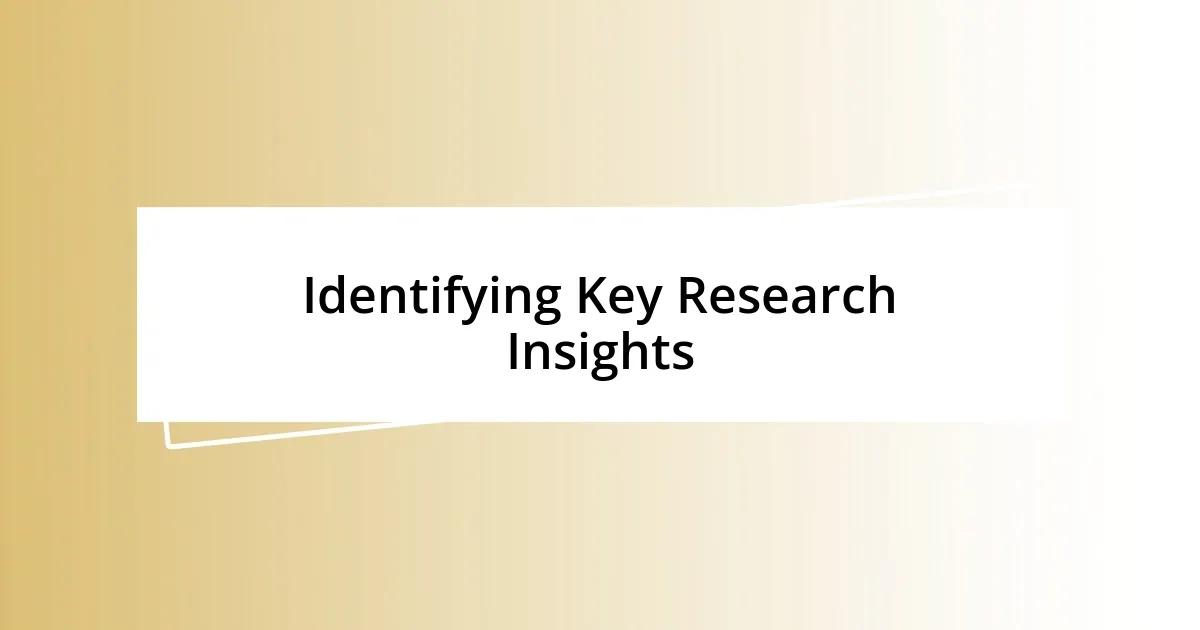
Identifying Key Research Insights
Identifying key insights in my research often begins with a systematic approach. I recall a project where I meticulously categorized my findings. By breaking down the data into thematic sections, I discovered a recurring trend that initially went unnoticed. This method taught me that structuring information can reveal significant insights hidden within the details.
As I reflect on my research processes, I recognize the role of intuition in pinpointing crucial insights. There was a point when I instinctively followed a lead based on preliminary findings. Trusting my gut feeling led me to an unexpected conclusion that shifted the entire direction of my study. This experience reinforced the idea that sometimes my intuition can be just as valuable as rigorous analysis.
Another aspect that enhances my ability to identify key insights is collaboration. I remember discussing my findings with a colleague who challenged my assumptions. This exchange sparked a new line of inquiry that I hadn’t considered. Engaging with others not only provides fresh perspectives but also strengthens the validity of my conclusions.
| Method | Insight Gained |
|---|---|
| Thematic Categorization | Uncovered recurring trends |
| Intuition Driven Exploration | Realized unexpected conclusions |
| Collaborative Discussions | Introduced fresh perspectives |
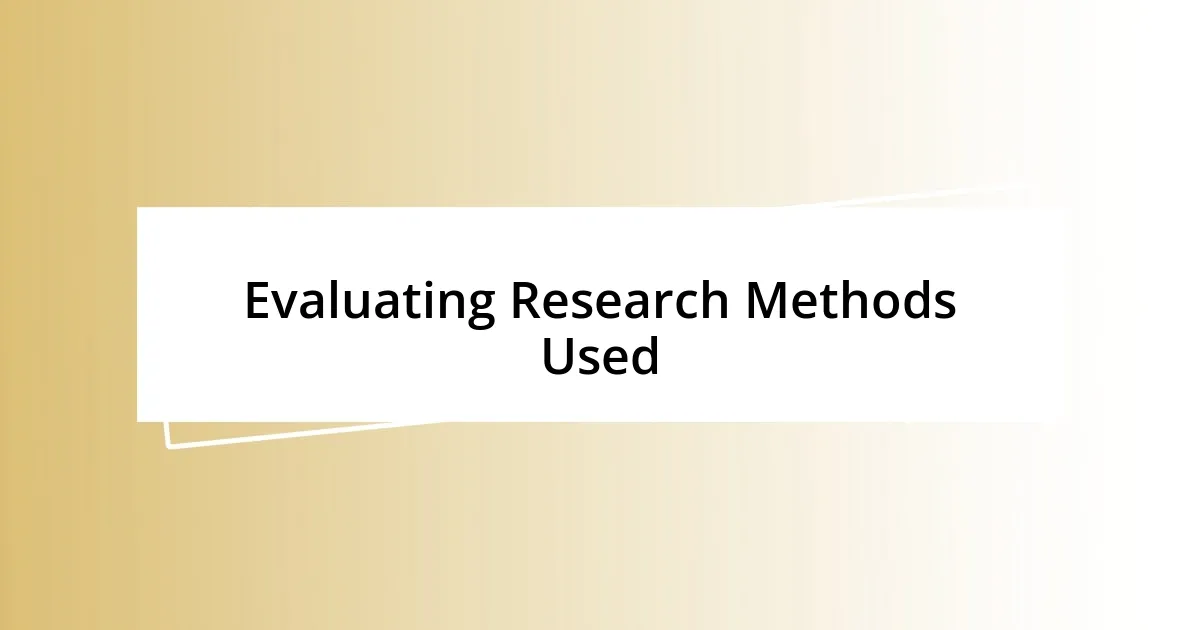
Evaluating Research Methods Used
Evaluating the research methods I’ve used often leads me to surprising conclusions about my own approach. For instance, while conducting a longitudinal study, I realized that relying heavily on quantitative data left out rich, qualitative insights. Looking back, I was struck by how much context was missing in my analysis. This reflection prompted me to incorporate interviews into future projects, allowing me to capture the human side of the data.
- Adjusting research design after initial findings
- Emphasizing both quantitative and qualitative methods
- Realizing the importance of diverse data sources
In my experience, it’s essential to routinely assess the effectiveness of my chosen research methods. I recall a time when I attempted to implement a survey tool that I believed was perfect. Yet, after collecting responses, it became evident that the questions didn’t resonate with participants. That misstep illuminated the critical need for pre-testing research tools. Now, I always evaluate whether my methods align with the environment and participants involved, ensuring a more fruitful research journey.
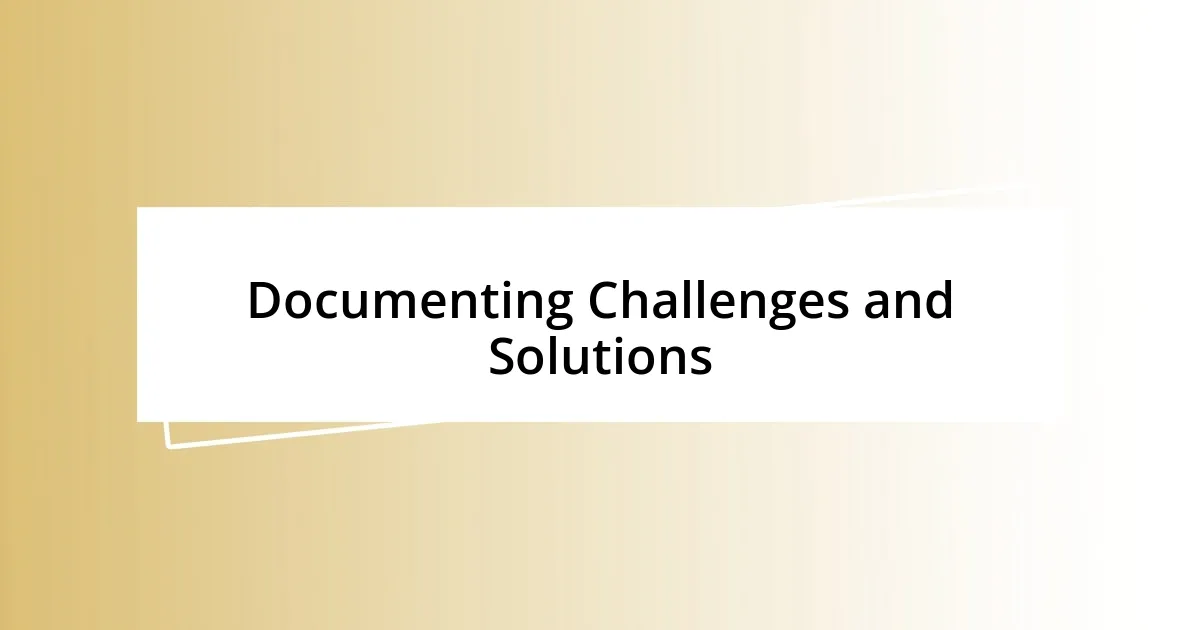
Documenting Challenges and Solutions
Documenting challenges I encounter during research has become an invaluable part of my process. I vividly recall a project that hit a snag when my data collection methods didn’t yield the expected results. Instead of feeling defeated, I took a step back to assess the problem. Reflecting on what went wrong helped me devise a more tailored data collection strategy, ultimately leading to richer results. Have you ever found yourself at a standstill, only to discover that a fresh perspective was all you needed? That’s a feeling I now view as essential in shaping my research journey.
When I face challenges, I always jot down not just the issue, but also the solutions I devised. I remember feeling overwhelmed by conflicting feedback on my analysis from different stakeholders. I created a chart, mapping out everyone’s comments alongside my original findings. This visual representation allowed me to see patterns in the feedback and more clearly identify areas that needed adjustment. Documenting these challenges led me to a more streamlined process, allowing me to embrace constructive criticism rather than shy away from it.
Reflecting on my research not only highlights the challenges but also showcases the solutions that emerged from them. For instance, there was a time when I underestimated the importance of ethical considerations in my study. The moment I realized that my approach could potentially harm participants, I took immediate action. I redesigned the study, addressing ethical concerns, which fostered trust and better engagement from participants. As I jot these reflections down, I can’t help but feel grateful for the lessons learned along the way. Each challenge, when documented, becomes a teaching moment—instilling growth and resilience in my research process.
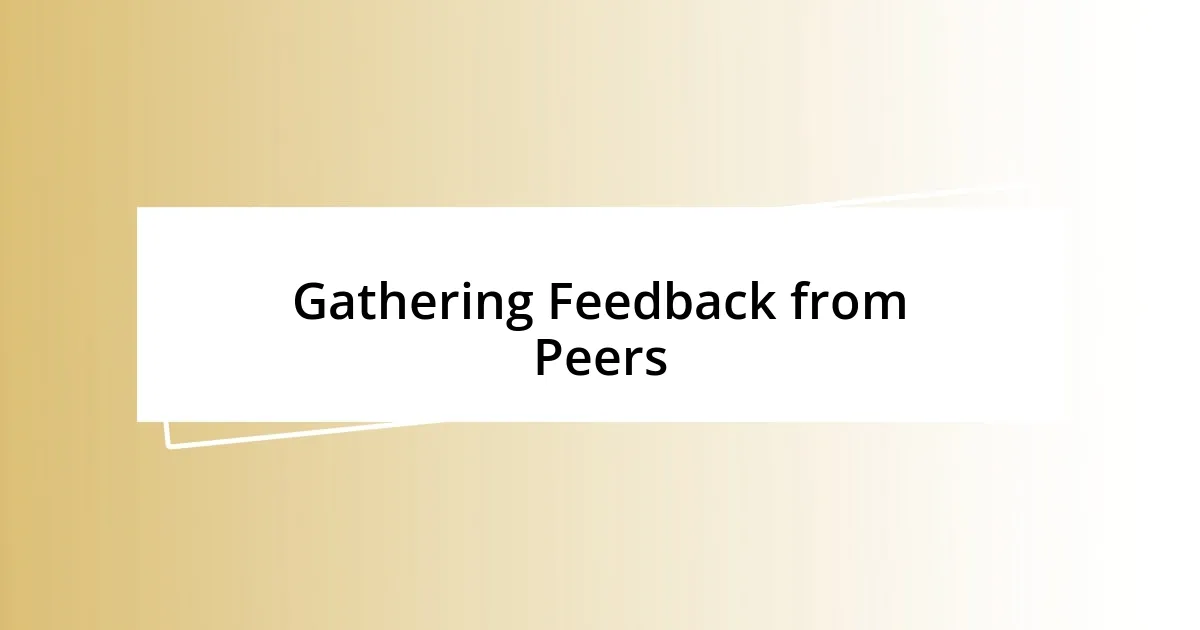
Gathering Feedback from Peers
Gathering feedback from peers is a crucial part of refining my research. I remember sharing an early draft of my findings during a team meeting. As I presented my ideas, I felt a mix of excitement and vulnerability. It was alarming when my peers raised questions I hadn’t even considered, but their insights ultimately led me to strengthen my argument. Isn’t it fascinating how a fresh pair of eyes can shine a light on gaps in our work?
In another instance, I solicited anonymous feedback on a project where I was too attached to my own perspective. Reading the comments was a bit like peeling back layers of an onion; it brought tears to my eyes but also clarity to my vision. Some suggestions felt harsh at first, but they pushed me to rethink my approach and really listen to what my audience needed. Have you ever felt that gut punch when you realize your work isn’t resonating the way you thought it would? Embracing that discomfort has become a part of my growth.
Rather than shying away from feedback, I actively seek it out, knowing it enhances the quality of my research. I recall attending a workshop focused on peer evaluation, which allowed me to practice giving and receiving constructive criticism. During one session, I was amazed by how quickly a colleague identified inconsistencies in my data interpretation. This experience drove home the point that collaboration isn’t just beneficial; it’s essential. Have you ever thought about how sharing your work could open doors to incredible insights you might have missed? My peers have become my unofficial advisory board, and for that, I am endlessly grateful.
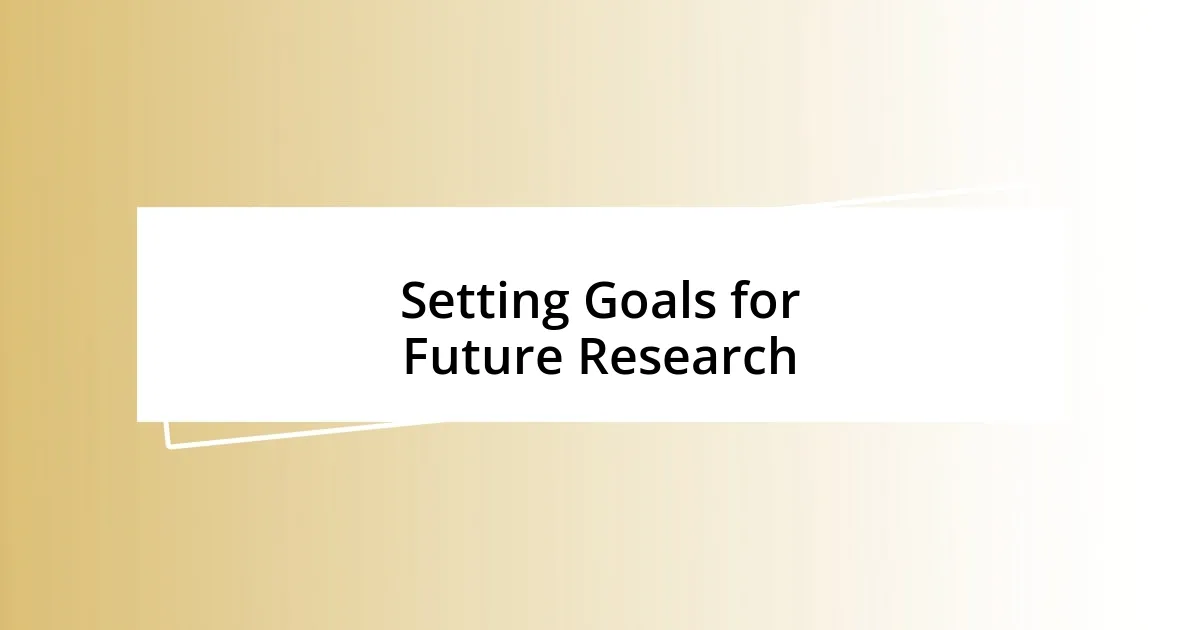
Setting Goals for Future Research
Setting goals for future research is an endeavor that I approach with both excitement and caution. Recently, I set an ambitious target to explore a new methodology I had only briefly encountered. At first, the idea made me nervous. I whispered to myself, “Could I really dive deep into uncharted waters?” But as I mapped out my plan, the sense of possibility grew, and I realized that stepping beyond my comfort zone often leads to the most enlightening discoveries.
As I define my goals, I always consider the broader impact of my research. I vividly remember a project where I aimed not just for academic validity but to create practical applications of my findings. It felt exhilarating to think about how my research might contribute to real-world change. Have you ever pondered how your work can resonate beyond the walls of academia? This perspective reshaped my goal-setting process, pushing me to align my objectives with tangible benefits for communities involved.
Moreover, I’ve learned to adapt my goals based on feedback and experiences. During a recent project, I initially aimed for a broad analysis but shifted my focus after realizing my energy was divided. I still recall the clarity that washed over me when I decided to hone in on a specific aspect of the data. It felt like narrowing down a massive canvas to paint a more vibrant picture. I’m curious—how often do we leave room for flexibility in our plans? Embracing adaptability has not only enhanced my research focus but also reinforced my passion for learning, making the journey feel less like a rigid path and more like a thrilling adventure.








